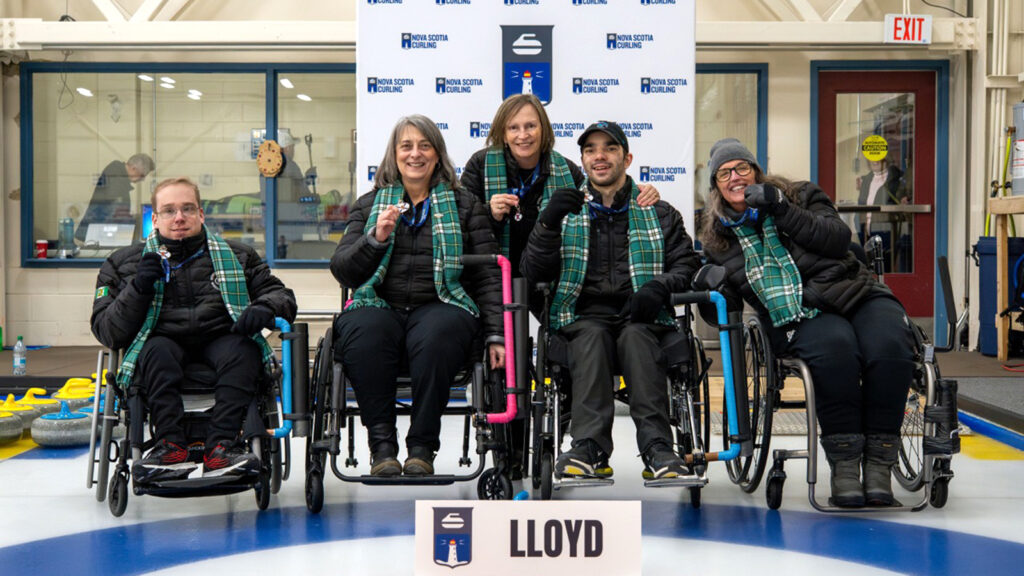
Like many sports, wheelchair curling suffered from a drop in participation during the COVID-19 pandemic.
Slowly but surely, the sport is making up for lost time.
“We had some really good success in the past, but when COVID hit, people withdrew from what they were doing and a lot of people didn’t come back,” said Jill Brothers, technical director of the Nova Scotia Curling Association, a five-time provincial women’s champion and a former Canadian junior women’s champion.
“I started talking with Laughie (Rutt), who runs the Lakeshore program in Sackville, and Stu (Slauenwhite), his coach, and we started talking about how to get this going again because there hadn’t been a provincial since before COVID and the last couple years we just awarded the championship to one team because they were the only one who entered.
“We started reaching out to people in our database and found out about a family in Sydney and a young guy named Kurtis Deveaux who was really into curling, and their family was so supportive and wonderful, so we sat down with them to try and figure out a way for them to get involved. We had a training camp at Lakeshore in September and they travelled down so we tried to give them as much knowledge as possible.”
There are some basic elements to the sport that have to be modified for the wheelchair game, with the primary one being no sweeping of rocks as they travel from one end of the rink to the other.
“What they do is get the rock in a position in that white space before the hog line for the thrower and have a teammate behind them to help stabilize their chairs when they push off, and there is a rock pusher in place to help get the rock ready for them to throw,” said Brothers.
“All the athletes need to know where to be so there’s enough space and know who’s going next, so there’s a pretty steep learning curve of when and where you need to be if you’re someone who’s new to the sport.”
The Sydney rink, skipped by Edie Lloyd with Deveaux unable to attend, travelled to Lakeshore in February for a best-of-five weekend series in February to crown a Nova Scotia champion against a team skipped by Rutt.
Rutt’s lineup, which includes Stephen Parfitt at third, Harris Josey at second, Marie Ann Maceachern at lead and fifth Nicholas Taylor, won the opener 8-6 on Friday and the second matchup 6-4 on Saturday afternoon. Lloyd’s team of third Thomas Odo, second Kimberley Turner and lead Mitchell Poswiata was able to prevail 6-4 in the Saturday evening draw to force a third day of competition Sunday.
The fourth game had its share of drama, as Lloyd put together a four-point seventh end to take an 8-6 lead coming home, but Rutt countered with four of his own to score the 10-8 decision and claim his ninth championship.
“I’ve been to this rodeo before,” said Rutt, who turned 70 in March. “But we had three rookies on my team this year (Josey, Maceachern and Taylor) and I’m so happy for them.
“I’ve been retired now for six years, so this is my big winter activity. And the joy of it is seeing other curling centres pick up on it. Lakeshore has been wonderful to us, it’s a nice accessible facility, but it’s so much more than that. It’s the people at the curling club who have been so welcoming to the wheelchair curlers. We curl here regularly against able-bodied people and are always welcome. They do a wonderful job of supporting wheelchair curling and they don’t care if it’s someone coming from another club or whatever. We’re probably going to have enough players for a second team out of here next year and we’re always looking for more.
“It’s not like wheelchair basketball or quad rugby or sports like that, which can be really rough on people. Curling involves strength, fitness and strategy, being mentally aware and able to adjust, and it’s a real team sport. You learn to communicate and socialize, just basic skills that can really make a difference in a person’s life.”





